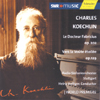Koechlin (Le) Docteur Fabricius; Vers la Voûte étoilée
Welcome first recordings of exotic works that look to the stars
View record and artist detailsRecord and Artist Details
Composer or Director: Charles (Louis Eugène) Koechlin
Genre:
Orchestral
Label: Hänssler
Magazine Review Date: 2/2005
Media Format: CD or Download
Media Runtime: 0
Mastering:
Stereo
Catalogue Number: 93 106

Tracks:
| Composition | Artist Credit |
|---|---|
| (Le) Docteur Fabricus |
Charles (Louis Eugène) Koechlin, Composer
Charles (Louis Eugène) Koechlin, Composer Heinz Holliger, Conductor Stuttgart Radio Symphony Orchestra |
| Vers la voûte étoilée |
Charles (Louis Eugène) Koechlin, Composer
Charles (Louis Eugène) Koechlin, Composer Heinz Holliger, Conductor Stuttgart Radio Symphony Orchestra |
Author: Ivan March
Much of Koechlin’s highly individual orchestral music remains unexplored: indeed, both works here are premiere recordings. Before he became a composer, Koechlin wanted to be an astronomer and his fascination with the ‘starry firmament’, and the dream world it evoked, is sensuously created in the arch-like structure of Vers la voûte étoilée (‘Towards the vault of stars’). Written in the early 1920s and revised in 1939, this demonstrates the composer’s exotic sound world in a nocturnal piece that does not outstay its welcome.
The stars in the heavens return in Le Docteur Fabricius, written between 1941 and 1944, a more ambitious, large-scale symphonic poem with a philosophical underlay, based on a short story by the composer’s uncle. In the narrative he describes a visit to the mysterious house in which the nihilistic Doctor Fabricius has cut himself off from the world ‘where nature is indifferent, using humans only to maintain life, and doing nothing to reduce human misfortune’. After an austere opening, dolorous chorales symbolise the philosphical disillusion, interrupted by a strident, fugal revolt and interwoven with moments of sadness.
This leads to a powerfully scored chorale suggesting that human hope always re-emerges. The visitor looks out to the starry firmament (the ondes martenot-rich scoring suggests Messiaen) and then, in a passage of radiant exultation, the spirit of Ravel hovers over the music to evoke the consolation of Nature. After an explosion of joy the music returns to the serene, withdrawn evocation of the opening.Koechlin’s powers as an orchestrator ensure his vision is powerfully communicated. Heinz Holliger is very much at home here, and the Stuttgart Radio orchestra play most responsively. The recording is full and atmospheric if not demonstration-class: one ideally needs a more voluptuous ambience. But this is well worth trying.
The stars in the heavens return in Le Docteur Fabricius, written between 1941 and 1944, a more ambitious, large-scale symphonic poem with a philosophical underlay, based on a short story by the composer’s uncle. In the narrative he describes a visit to the mysterious house in which the nihilistic Doctor Fabricius has cut himself off from the world ‘where nature is indifferent, using humans only to maintain life, and doing nothing to reduce human misfortune’. After an austere opening, dolorous chorales symbolise the philosphical disillusion, interrupted by a strident, fugal revolt and interwoven with moments of sadness.
This leads to a powerfully scored chorale suggesting that human hope always re-emerges. The visitor looks out to the starry firmament (the ondes martenot-rich scoring suggests Messiaen) and then, in a passage of radiant exultation, the spirit of Ravel hovers over the music to evoke the consolation of Nature. After an explosion of joy the music returns to the serene, withdrawn evocation of the opening.Koechlin’s powers as an orchestrator ensure his vision is powerfully communicated. Heinz Holliger is very much at home here, and the Stuttgart Radio orchestra play most responsively. The recording is full and atmospheric if not demonstration-class: one ideally needs a more voluptuous ambience. But this is well worth trying.
Discover the world's largest classical music catalogue with Presto Music.

Gramophone Digital Club
- Digital Edition
- Digital Archive
- Reviews Database
- Full website access
From £8.75 / month
Subscribe
Gramophone Full Club
- Print Edition
- Digital Edition
- Digital Archive
- Reviews Database
- Full website access
From £11.00 / month
Subscribe
If you are a library, university or other organisation that would be interested in an institutional subscription to Gramophone please click here for further information.




